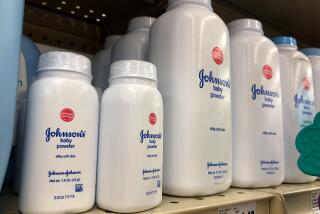Firm Guilty and Not Guilty in Dead Dog Case
- Share via
Prosecutors did not conclusively prove that Pooh the pet poodle died as the result of pesticide placed in a Bel-Air canyon by an exterminating firm, a Los Angeles Municipal Court jury decided Thursday.
The jury did, however, convict Dewey Pest Control Co., one of the state’s largest, on a misdemeanor count of having improperly employed sewer rat poison outdoors, contrary to label instructions.
Dewey officials and the city attorney’s office both claimed victories of sorts in the unusual criminal case, which stemmed from the March, 1984, death of Pooh, a 9-year-old toy poodle owned by Teri Redack and her husband, Jay, one-time producer of the TV game show “Hollywood Squares.”
Dewey, whose lawyer said he intends to file a motion for a new trial, faces a $1,000 fine when Judge Mel Red Recana passes sentence Sept. 16. Eleven-year Dewey employee Wendell Davis could receive a $1,000 fine and a maximum six-month jail sentence.
The defendants also faced similar penalties on the count on which they were acquitted: placing rat poison in a location where it could endanger such “non-target” animals as Pooh.
Blood Test Results
The dog died three days after Teri Redack rushed her to a veterinarian because of the dog’s labored breathing. Although no autopsy was performed, the prosecution argued, blood tests showed that the poodle’s illness was consistent with that of poisoning caused by rodenticides.
Redack notified health and agriculture officials when she learned that Dewey had placed rat bait blocks on her next-door neighbor’s property within a day or two of the time her dog took ill.
The defense contended that there was no conclusive proof that Pooh died from Dewey’s bait blocks. There were no dog’s teeth marks on the blocks, Moore said, and besides, Pooh was not on a leash and could have been poisoned anywhere.
“I call it a victory. . . . We were completely vindicated on count two,” said defense counsel Richard Moore. “And of course that was the count that carried the serious allegations with respect to the reputation of Dewey Pest Control.”
Dewey President Ronald Pelham added, however, that the misuse conviction will prove “a very bad blow for the pest control industry in general. It’s saying that we cannot use the labels in the way that we interpret them as licensed professionals.”
Label Instructions
A key issue during the nearly two-week trial was whether Dewey illegally ignored instructions on the label of rat bait blocks designed for sewers when Davis placed the blocks in honeysuckle plants.
The state-registered labeling on the poison reads, “Suggested use: For control in sanitary and combination sanitary and storm sewers. . . .” The label also says, “Caution: Protect bait from children, pets and domestic animals.”
In convicting the firm on the labeling charge, jurors agreed with Deputy City Atty. Keith Pritsker that poison designed for sewers cannot be used outdoors. The defense had argued that the poison can be placed outside because the label was only a “suggested use.”
Pritsker said he is pleased with the verdict because the city accomplished its main objectives.
“First of all, the manufacturers of poison have changed the labels clarifying the restricted use of this product to sewers,” Pritsker said. “And there is now heightened awareness concerning the safe use of bait blocks within the industry and the public.
‘Held to Answer’
“Pest control companies are now aware they’ll be held to answer in the city of Los Angeles for indiscriminate use of pesticides,” he added.
Dewey has stopped using sewer rat bait blocks outdoors, Pelham said.
Jury foreman Benjamin Allen said the jury pooh-poohed the prosecution’s endangerment charge: “We did not think there was enough evidence the dog died from that bait block. There were other possibilities . . . the dog was loose; it was on its own.”
He added, however, that the firm illegally ignored the label. “You may not deviate from the instructions on the label . . . (and) they used this product outdoors,” he said.
Although she expressed disappointment at the acquittal on the one count, Redack said she was delighted by the partial conviction. “I feel Dewey has a very cavalier attitude about the poisons. . . . The guilty verdict will send a message out loud and clear to pesticide companies,” she said.
More to Read
Sign up for Essential California
The most important California stories and recommendations in your inbox every morning.
You may occasionally receive promotional content from the Los Angeles Times.












